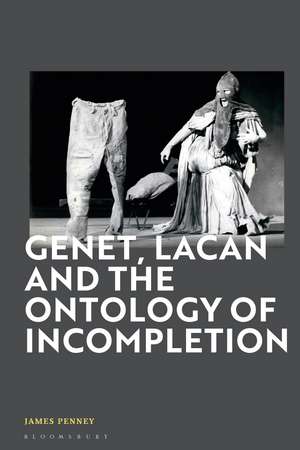Genet, Lacan and the Ontology of Incompletion
Autor James Penneyen Limba Engleză Paperback – 21 aug 2024
| Toate formatele și edițiile | Preț | Express |
|---|---|---|
| Paperback (1) | 191.13 lei 3-5 săpt. | |
| Bloomsbury Publishing – 21 aug 2024 | 191.13 lei 3-5 săpt. | |
| Hardback (1) | 510.34 lei 6-8 săpt. | |
| Bloomsbury Publishing – 25 ian 2023 | 510.34 lei 6-8 săpt. |
Preț: 191.13 lei
Preț vechi: 249.26 lei
-23% Nou
Puncte Express: 287
Preț estimativ în valută:
36.57€ • 39.85$ • 30.82£
36.57€ • 39.85$ • 30.82£
Carte disponibilă
Livrare economică 02-16 aprilie
Preluare comenzi: 021 569.72.76
Specificații
ISBN-13: 9781350300545
ISBN-10: 1350300543
Pagini: 232
Dimensiuni: 156 x 234 x 25 mm
Greutate: 0.33 kg
Editura: Bloomsbury Publishing
Colecția Bloomsbury Academic
Locul publicării:London, United Kingdom
ISBN-10: 1350300543
Pagini: 232
Dimensiuni: 156 x 234 x 25 mm
Greutate: 0.33 kg
Editura: Bloomsbury Publishing
Colecția Bloomsbury Academic
Locul publicării:London, United Kingdom
Caracteristici
First book-length study to put Genet's work into dialogue with Lacanian psychoanalysis, revealing a theoretical affinity that has yet to be properly appreciated
Notă biografică
James Penney is Professor of Cultural Studies and French and Francophone Studies at Trent University, Canada. He is the author of After Queer Theory: The Limits of Sexual Politics (2014), The Structures of Love: Art and Politics Beyond the Transference (2012), and The World of Perversion: Psychoanalysis and the Impossible Absolute of Desire (2006).
Cuprins
Introduction: Acts of Poetry, Acts of Interpretation1. Logic and Fantasy: Freud on Moses 2. Towards Feminine Being: Our Lady of the Flowers3. The Phallus Unveiled: The Balcony4. Residue of Modernity, Wound of Being: Genet on Art5. Postcoloniality Meets Indeterminate Negation: The Screens6. The Image of Absence: Prisoner of LoveBibliography Index
Recenzii
A much needed, illuminating and beautifully-written book. Philosophical and Lacanian concepts that typically remain mired in obscurity spring to life in Penney's text. A more masterly treatment of the relationship between the writings of Lacan and Genet - indeed, between psychoanalysis and poetry - will not be forthcoming.
Penney engages the most significant readings of Genet's work while offering fresh analyses of his own. The latter derive their subtety and strength from the vigilant attention they give to the wobbly, disjunct, relations that unite sexual pleasure and language. Political structures, Penney shows, sway with this imbalance.
James Penney's book is a delightfully fresh account of Jean Genet, whose work seems to be gaining in relevance as time goes on. Remarkably rich in detail and insight, the book presents us with a compelling rendering of Genet's ontology and a powerful theory of the poetic act.
Penney engages the most significant readings of Genet's work while offering fresh analyses of his own. The latter derive their subtety and strength from the vigilant attention they give to the wobbly, disjunct, relations that unite sexual pleasure and language. Political structures, Penney shows, sway with this imbalance.
James Penney's book is a delightfully fresh account of Jean Genet, whose work seems to be gaining in relevance as time goes on. Remarkably rich in detail and insight, the book presents us with a compelling rendering of Genet's ontology and a powerful theory of the poetic act.
